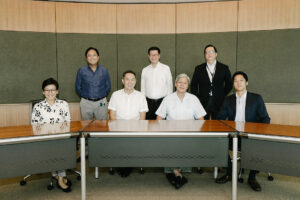Like-mindedness, shared values, and a common commitment to the rules-based order in the Indo-Pacific

hosted by the US Forces and the Royal Australian Forces. — MOD.GO.JP
Last week, significant developments involving other countries took place and reaffirmed our common commitment to the rules-based international order in the Indo-Pacific region.
On Friday, Aug. 25, two Japanese navy vessels — the JS Izumo (DDH-183) and JS Samidare (DD-106) — arrived in Manila for ongoing maritime exercises here, dubbed the Indo-Pacific Deployment (IPD) Exercises 2023.
According to the Japanese Embassy in Manila, the visit is in line with Japan’s commitment to work with regional partners and to demonstrate our interoperability and combined capabilities to ultimately achieve the vision of a “Free and Open Indo-Pacific” (FOIP).
On the same day, the Armed Forces of the Philippines (AFP) and the Australian Defence Force conducted their first combined amphibious assault exercise in San Antonio, Zambales. The exercise simulated combined operations between the two countries’ militaries: they retook an island supposedly occupied by enemy forces.
The exercise showcased the two countries’ military interoperability. No less than President Ferdinand Marcos, Jr. witnessed it, which was part of the Exercise Alon 2023.
This week, we commemorate the 72nd anniversary of the ratification of the Philippines’ 1951 Mutual Defense Treaty (MDT) with the United States of America. This agreement was no doubt conceived of under vastly different circumstances at the time, when the world was just learning the lessons from a war that killed millions, set back development, and redefined alliances, and when new tensions were brewing between two superpowers.
Over the years, there have been calls to review the MDT to assess its continuing relevance. The fact that it is still here, albeit supplemented by subsequent agreements such as the Visiting Forces Agreement of 1998 and the Enhanced Defense Cooperation Agreement of 2014, is a testament to its longevity and the fundamental value of its premise.
Today we view the MDT in the light of the actions of our giant neighbor to the West, China. Incident upon incident in the West Philippine Sea has convinced us that even “peacetime” does not translate to an absence of threat and risk. In fact, the risks have taken on many forms: they could be traditional, they could be non-traditional, they could be evolving. The world itself has changed since 1951 when two superpowers were dominant. Thus, the manner in which we address these risks has to be different.
On Aug. 5, China used water cannons against Philippine boats on a resupply mission off Ayungin Shoal, established as part of our Exclusive Economic Zone. When our officials tried to reach out to China at the height of the crisis, our calls went unanswered.
We were agitated by the audacity of the water cannon incident, and yet we realized this is hardly new nor surprising. After all, in February, China used a military-grade laser on a Philippine boat that was also on a resupply mission, causing the temporary blindness of a crew member.
There are no indications that China will stop anytime soon, much less acknowledge that what it is doing is contrary to international law and basic decency.
For Filipinos, the salient point in the MDT is Article V: “An armed attack on either of the Parties is deemed to include an armed attack on the metropolitan territory of either of the Parties, or on the island territories under its jurisdiction in the Pacific Ocean, its armed forces, public vessels, or aircraft in the Pacific.” It gives us comfort that we will not be left on our own in case we are attacked by anyone.
But while China’s acts are provocative and coercive, they have been calculated such that they are not quite provocative and coercive enough to be deemed an armed attack on the Philippines. They are almost the textbook definition of “gray zone operations.”
This is the reality in which we live. And this is also why we choose to think of the traditional, nontraditional, and evolving risks of our current world as also an opportunity for nations of the world to come together for a common cause. The critical landscape in the Indo-Pacific region pushes states to cooperate in order to maintain peace and stability and to discourage attempts by some nations to disturb the world order.
Certainly, the MDT remains valuable to the Philippines, and we will always take heart in the friendship and support offered by the Americans. Our alliance goes back many years. At the same time, we have expanded our circle such that we are now anchored on a broader alliance — that which we have with other like-minded states that share our values and commitment to peace and stability in the Indo-Pacific region.
The US, being the country that the highest number of Filipinos continue to trust, is in that circle, as are our friends Japan, Australia, the European Union, and India, among others. With these countries, we work toward maintaining the established order that is based on the rule of law.
We are stronger together.
Last year, President Marcos said that only the national interest will drive our foreign policy. More than ever, the country is convinced that it is in the national interest to assert our rights in the West Philippine Sea, as evidenced by a Pulse Asia survey last year showing that 89% of respondents agreed. This year, another Stratbase-commissioned Pulse Asia poll showed that 72% of Filipinos believe the Marcos administration should strengthen our military capability, 64% believe we should conduct joint military patrols and exercises with allied countries, and 61% say we should shift the focus of our defense institutions to external threats.
In these precarious times, it is good to know that we can rely on our friends to defend what is ours and keep coercive states from destabilizing the rules-based international order. Indeed, peace and stability are in the interest of the nation, the region, and, ultimately, the world.
Victor Andres “Dindo” C. Manhit is the president of the Stratbase ADR Institute.




